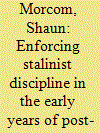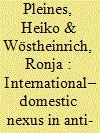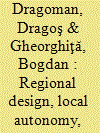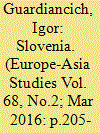|
|
|
Sort Order |
|
|
|
Items / Page
|
|
|
|
|
|
|
| Srl | Item |
| 1 |
ID:
144194


|
|
|
|
|
| Summary/Abstract |
A distinctive approach to disciplining the Soviet population emerged following the Terror of 1937–1938, and as a consequence of World War II, around the notion of socio-political and socio-economic ‘organisation’. The early post-war years as a consequence saw the introduction of innovative means of social disciplining in all areas of Soviet society. The infamous attack on the post-war intelligentsia, in particular, resulted from Stalin’s belief that only through the intelligentsia’s correct ‘leadership’ of this socio-economic ‘organisation’ would the Soviet Union be able to meet its challenges of reconstruction and superpower consolidation. This post-Terror and post-war phase in Stalinism marked a lasting turn, which consolidated the authoritarian socio-political dynamics evident in the later post-Stalin Soviet system.
|
|
|
|
|
|
|
|
|
|
|
|
|
|
|
|
| 2 |
ID:
144193


|
|
|
|
|
| Summary/Abstract |
This article looks at the application, in the anti-corruption realm, of the analytical framework developed for transnational human rights advocacy by Risse, Ropp, and Sikkink. Focusing on Azerbaijan, Kazakhstan, and Turkmenistan, this article shows that the level of integration with Western actors on the state and corporate levels determined the degree to which the transnational anti-corruption regime has been accepted in the Caspian region. As the transnational regime does ultimately lack coercive powers, the tension between transnational demands and national political elites does not translate into serious conflict, as a broader formal acceptance of the transnational anti-corruption regime offers national actors only limited opportunities to genuinely promote the issue.
|
|
|
|
|
|
|
|
|
|
|
|
|
|
|
|
| 3 |
ID:
144190


|
|
|
|
|
| Summary/Abstract |
The institutionalisation and nationalisation of Russia’s party system, which is dominated by United Russia (Edinaya Rossiya—UR), has played a major role in the building of Putin’s ‘power vertical’. Nevertheless, despite the fact that formal relations within UR are highly centralised, informal practices allow for far greater degrees of regional autonomy. Focusing on UR’s candidate selection for the 2011 Duma election this article provides an examination of cross-regional variations in the relations between UR’s Party Centre and its regional branches. As electoral legislation requires the segmentation of party lists into ‘regional groups’, the composition of the regional lists, specifically the share of ‘native candidates’, is considered as an indicator of the level of autonomy of regional branches. Ordinal regression analysis confirms our main theoretical hypotheses. In the more financially autonomous regions, UR’s regional branches will have more leverage and bargaining power in their relations with the Party Centre. A second important factor is heterogeneity: the more a region’s socio-economic indices deviate from the national average (either up or down), the less its UR branch is subordinate to the Party Centre.
|
|
|
|
|
|
|
|
|
|
|
|
|
|
|
|
| 4 |
ID:
144192


|
|
|
|
|
| Summary/Abstract |
Despite many institutional features being changed during the post-communist transition, the regional administration in Romania witnessed a very limited change in post-communist times. Although it was a total political failure, the recent reshaping of the regional administration triggered a vivid public and scholarly interest on the matter. The purpose of the article is to shed new light on political constraints operating when it comes to reshaping regional design in Romania. Whereas official arguments pointed towards the necessity to address EU conditionality, the reshape was more likely underpinned by the government’s attempt to gain electoral advantages in the local elections scheduled for 2012. The decisive opposition made to the project by the Democratic Alliance of Hungarians in Romania (Uniunea Democrată a Maghiarilor din Romania) reveals the importance that ethnic factors have played in this context.
|
|
|
|
|
|
|
|
|
|
|
|
|
|
|
|
| 5 |
ID:
144189


|
|
|
|
|
| Summary/Abstract |
During the Great Recession, Slovenia recorded one of the worst economic performances within the EU. Such a decline is surprising as the country was the most stable among the post-socialist states. The article individuates the root cause for the downfall in protracted reform gradualism, which resulted in an inefficient privatisation process. This locked the country into a ‘partial reform equilibrium’ where economic elites extracted rents. Following accession to the EU, the unsustainable lending practices of state-owned banks to corporate organisations and the gridlock in policymaking pushed the country into an economic and political ‘bad equilibrium’. Even though the Slovenian export sector proved to be surprisingly resilient, a massive debt overhang and a huge reform backlog are still weighing down on a healthy recovery.
|
|
|
|
|
|
|
|
|
|
|
|
|
|
|
|
| 6 |
ID:
144191


|
|
|
|
|
| Summary/Abstract |
This article questions why, and indeed how, Muslims have committed to democratisation in post-communist Albania. The explanatory framework merges the theoretical insights of the moderation paradigm with the specific devices that characterise the post-communist religious field in investigating Muslims’ support for democracy. The empirical analysis draws on a within-case comparison of Muslims’ behaviour in three consequential stages of democratic transition—each marked by different configurations of institutional settings and ideological options, which we trace as potential explanations. The analysis suggests that institutional arrangements played the primary role. Yet, learning from the experience of dictatorship and from a ready pool of inherited Albanian-specific templates facilitated the consensual reclaiming of Islam in a local, pro-democratic, and pro-European manner.
|
|
|
|
|
|
|
|
|
|
|
|
|
|
|
|
|
|
|
|
|